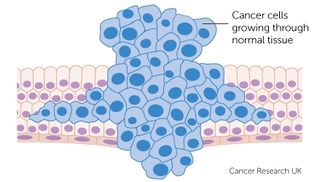Creativity
Why Everyone Will Eventually Get Cancer
The same thing that drives evolutionary innovation also gives us cancer.
Posted May 22, 2018
Through graduate school and my postdoctoral fellowship, my research was in the area of cancer biology. I'll never forget the time that I had lunch with Bob Weinberg, probably the most famous and most important cancer researcher of all time. When someone asked him why cancer rates were rising, he said, "mostly because we're living longer. If you live long enough, you will get cancer."

This is a jarring thought, to be sure, but it's also something that should have been obvious to me, even back then. While environmental, dietary, and lifestyle factors certainly play some role, most of the rise in cancer is simply because we're no longer dying of so many other things. Just 100 years ago, the leading causes of death were pneumonia, influenza, tuberculosis, and gastrointestinal infections such as cholera. Thanks to vaccines and improvements in public sanitation, these have been all but eradicated in the developed world. Even deaths by accidents have been cut by half, per capita, over the past century. We are living longer and healthier lives than ever before. Until we get cancer.
But why is cancer the beast that stalks us all? The genetics of cancer is extremely complicated, but one doesn't need to appreciate all the mechanisms in order to grasp the basics. Cancer results through the accumulation of the wrong combination of mutations in the wrong order. Inside our cells, we have genes and proteins that drive cells to divide and multiply and others that hold cells back. When these control mechanisms malfunction, cancer results. (For a longer discussion of mutations and cancer, read my article in The Guardian on this same topic.)
How do these pathways malfunction? Mutations. While certain chemicals, lifestyle, and dietary factors also add to this picture, we all have a background rate of mutation that is due to nothing more than copying errors made when we synthesize DNA. Before a cell can divide, it must copy all of its DNA and when it does so, random mistakes are made. While an error rate of one-in-a-million seems very low, remember that our body has trillions of cells and there is a lot of cell division going on in our bodies all the time.

Every day, we suffer hundreds of mutations around our body. Obviously most of these are harmless, but occasionally they can cause problems. The morbid reality is that every time a cell divides, it's a roll of the dice. Eventually, a mutation will strike that inches a cell toward becoming cancerous. Then, years later, it will get nudged again. In their now-classic paper, "The Hallmarks of Cancer," Bob Weinberg and Douglass Hanahan outline the six defining features of a cancer cell. Key to the transition from normal cell to cancer cell is the accumulation of mutations.
So it seems simple: Mutations are bad. Well, for individuals yes, but mutations are also essential for evolution. They are the raw material of all evolutionary innovation. Over evolutionary time, mutations (this time in the "germ line"—sperm or eggs) are what produce all manner of diversity in the forms of various tweaks, tugs, and random changes in all possible directions. Most of that random variation is neutral or bad, but occasionally, a mutation that brings a new and creative functionality will emerge. Natural selection then acts on that beneficial mutation, and this is the essence of adaptation and evolutionary innovation.
So mutations are what drove evolutionary innovation and adaptive radiation, from the earliest single-celled organism building the first signs of stable energy metabolism nearly four billion years ago, through to the expansion of the human cranium over the past two million years. Mistakes in our DNA are the reason there is more than just cells and goo on our planet.
Mutations are responsible for everything great that we are, and they will eventually kill us all. Mutations: Can't live with 'em, can't progress without 'em.
References
Hanahan and Weinberg. "The Hallmarks of Cancer." 07-Jan 2000. Cell. 100(1):57-70.
Lents NH. "Cancer, mutations and the facts of life" The Observer. 22-April 2018.


